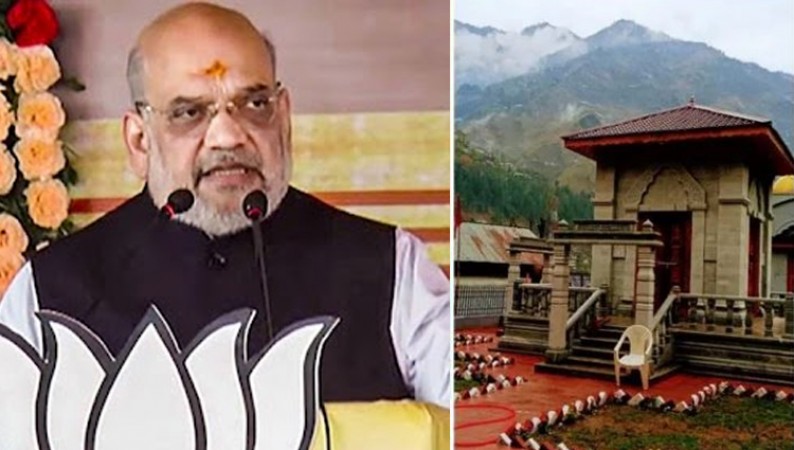
SRINAGAR: Home Minister Amit Shah today, March 22, virtually inaugurated the Mata Sharda Devi temple near the Line of Control (LoC) in Karnah sector of Jammu Kashmir, saying the abrogation of Article 370 is taking the UT back to its old traditions, culture and the “Ganga-Jamuna Tehzeeb”.
The Home Minister said the opening of the temple was the beginning of the new dawn and quest for reviving the Sharda culture. "To celebrate the auspicious beginning of our new year, the Mata Sharda Temple is being opened to devotees. This is encouraging news for followers all throughout the nation. For decades to come, Mata Sharda's benediction will continue to cover the entire nation, he said in his statement.
The Union minister bemoaned his inability to be present in person but made a commitment to stop by the temple on his subsequent trip to J&K.
Every time he visited Jammu and Kashmir, he began by bowing before the Mata Sharda Devi temple.
Shah said, this is the start of a new dawn, made possible by Mata Sharda Devi's blessings and the combined efforts of the people, especially civil society, on both sides of the Line of Control. "I send my warmest congratulations and gratitude to Ravinder Pandita, head of the Preserve Sharda Committee, for his long-term battle that has now paid off. This action is more than just a temple renovation; it marks the start of the effort to revive Sharda culture, he said. He noted that Sharda Peeth was previously regarded as a centre for education in the Indian subcontinent.
The Union Home Minister further said in reference to Pandita's demand that Sharda Peeth be opened across the LoC along the lines of the Kartarpur corridor that the Centre "will undoubtedly make efforts on this and there is no doubt over it."
"Peace has been built in Kashmir after Article 370 was repealed thanks to Prime Minister Narendra Modi's efforts, and it has taken the valley as well as Jammu back to its historic customs, culture, and Ganga-Jamuna Tehzeeb," he said.
Jammu Kashmir has taken initiatives in all sectors towards social and economic change, under which renovation work is going on at 123 selected places of religious significance, the Home Minister said.
Many temples and Sufi sites are undergoing renovations, including Ziyarat Shareef Reshimala, Ram Mandir, Safakadal Temple, Haloti Gompa Temple, and Jagannath Temple. According to him, 35 spots would be refurbished and revitalised in the first phase with a budget of 65 crore.
20 cultural "utsavs" were also organised in each district, along with 31 big cultural events and the identification of 75 religious sites and Sufi shrines. Our ancient legacy has been revived as a result, he continued.
Manoj Sinha, the Lt. Governor of J&K, has been commended for carrying out all of PM Modi's policies in the UT, and Shah praised his zealous work ethic.
"Sinha has contributed significantly to attracting industrial investments to J&K under Modi's direction. I commend and respect the J&K government and its leader Manoj Sinha for this," he remarked.
The Union minister also thanked everyone who was a part of the civil society under Pandita's leadership on both sides, in Jammu and Kashmir and PoK, for the opening of the temple in the Kupwara district of north Kashmir.
In order to revitalise the centuries-old pilgrimage to Sharda Peeth temple in Pakistan-occupied Kashmir, the historic temple and its centre are being renovated (PoK).
The Kashmiri name for the goddess Saraswati is Sharada Peeth, which translates to "the seat of Sharada". It was a premier institution of higher learning on the Indian subcontinent in antiquity.